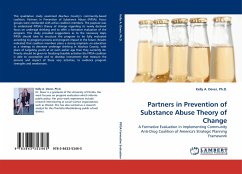In the mid-1980 s, during Regan s national War on
Drugs , crack cocaine emerged in the inner-cities,
adding a new dimension to the issue of illicit drug
use in the United States. During this time period,
there was a growing interest in the complexities of
drug and alcohol use by pregnant women. By the end
of the decade, these issues merged together which
resulted in a new national social problem to
eliminate: to save innocent crack babies from their
dangerous and irresponsible crack moms . In
addition to providing an in depth case study on the
Interagency Policy in Charleston SC, this book
examines the discourse surrounding the social
construction of crack babies and crack moms and
illustrates how these stereotypes aided in providing
justification for the practice of incarcerating
pregnant drug addicts as well as the creation of
fetal rights legislation in South Carolina. This
study illustrates the complexities of the impact
race, class, gender and cultural ideologies had on
shaping these punitive responses which eventually
were found to violate constitutional rights.
Drugs , crack cocaine emerged in the inner-cities,
adding a new dimension to the issue of illicit drug
use in the United States. During this time period,
there was a growing interest in the complexities of
drug and alcohol use by pregnant women. By the end
of the decade, these issues merged together which
resulted in a new national social problem to
eliminate: to save innocent crack babies from their
dangerous and irresponsible crack moms . In
addition to providing an in depth case study on the
Interagency Policy in Charleston SC, this book
examines the discourse surrounding the social
construction of crack babies and crack moms and
illustrates how these stereotypes aided in providing
justification for the practice of incarcerating
pregnant drug addicts as well as the creation of
fetal rights legislation in South Carolina. This
study illustrates the complexities of the impact
race, class, gender and cultural ideologies had on
shaping these punitive responses which eventually
were found to violate constitutional rights.








